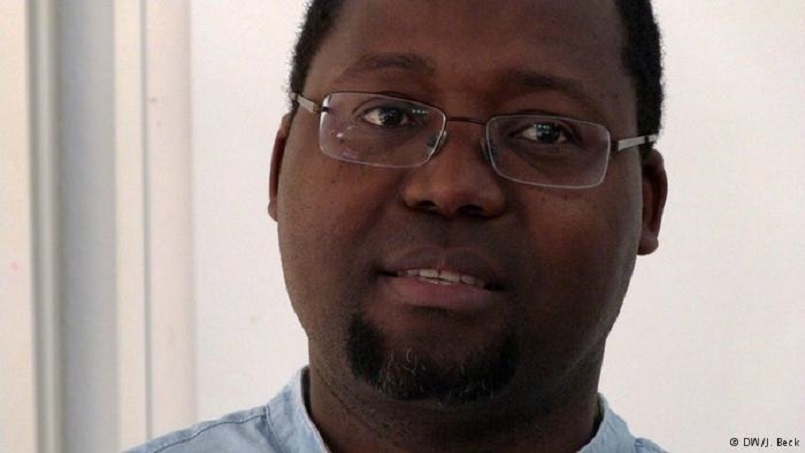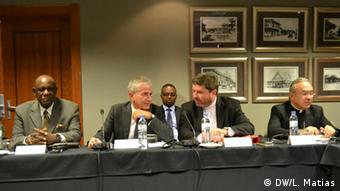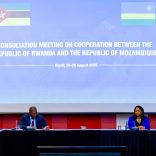Graça Machel turns 80: Chapo praises “illustrious daughter of Mozambique and citizen of the world”
Sociologist critical of Mozambique peace talks process

DW / Elísio Macamo
On Tuesday 27 September, the international mediators in the peace talks in Maputo between the Mozambican government and Renamo presented a proposal on the requirement of the largest opposition party to rule in six provinces where it claims election victory.
After another meeting of the Joint Commission, mediator coordinator Mario Raffaelli did not reveal details on the proposal, saying only that the parties “will reflect”, and added that reaching a consensus on the appointment of Renamo governors would facilitate decentralisation.
After nearly 20 rounds of negotiations, there is still no agreement in sight in Mozambique. The government and Renamo delegations continue to discuss the four items on the agenda but have not so far overcome their differences.
According to the mediators’ coordinator, the decentralisation of power required by Renamo and the cease-fire demanded by the government are the main points that must be resolved for peace to return to the country. Raffaelli however says “lack of trust between the parties” is the greatest obstacle to consensus.
A statement that “is not at all interesting when it comes from the main mediator”, according to Elísio Macamo, researcher at the University of Basel in Switzerland. In an interview with DW Africa, the Mozambican sociologist admits that distrust is an issue in peace negotiations in Mozambique, but says the way the process is being conducted is likely to lead to a “kind of ‘Rome Agreement Mark II'”.
DW Africa: Is distrust between the parties the main difficulty in the negotiations of peace in Mozambique?
Elísio Macamo (EM): They are parties in conflict. It is natural that there is no trust. I can understand that this is a problem, but at the same time, without wishing to deny him any merit, I think Mario Raffaelli should have known from the start that this would be the biggest problem. The entire negotiation process has to do with building trust for the subjects to be addressed. I do not think the statement is at all interesting, taking into account that it comes from the main mediator.
DW Africa: How can these bases of trust that he speaks about be built? How can the distrust between the parties be overcome?
EM: That’s the big problem. I personally have a lot of difficulties regarding this process. Everything seems to be reduced to a matter of accommodation of interests of Renamo and Frelimo which, in principle, should be the interests of the government and of Mozambican society. And I think this is a bad starting point for solving the problems we have in Mozambique. This is not about accommodating interests; it is about finding a way of living in a country and being able to solve our problems without violence and without the intervention of all these people who, fortunately, are always willing to help us.
On the other hand, this process should include more people: the other political parties and civil society organisations. Everyone should be at the negotiating table to discuss how Mozambique should be structured politically so that we can solve these problems. What we are doing now is a sort of ‘Rome Agreement Mark II’. And the problems we have today are the direct result of the failure of the first Rome agreement. I do not think a second version will be able to solve the Mozambique’s problems. This is also something that mediators should know. I find it very strange that they do not seem are aware of it.
DW Africa: What failed in the process of reconciliation in Mozambique?
EM: A lot failed. It is true that a lot also worked because we had political stability for many years, but the foundation on which everything is based failed. First, the big lie according to which Renamo fought for democracy. The problems of Renamo clearly show that democracy has never been an issue for this party. We work with this fiction for a long time and we were not able to find answers to the difficulties of Renamo becoming a truly democratic party, as was its desideratum – if we want to be generous in this regard.

The other lie came from the side of Frelimo. It is increasingly clear that the Rome Agreement, for Frelimo, was not necessarily about accepting real democracy in the country. It was about Frelimo again securing minimum conditions for continuing to think that it was the sole and legitimate representative of the Mozambican people. These two great lies largely compromised the Rome Agreement.
DW Africa: Do you believe that the current negotiations will lead to a permanent agreement?
EM: The negotiations may lead to an agreement. Will they lead to a permanent agreement? This will depend on many things. It will depend on the evolution of the main political parties themselves, but also of a certain change of attitude within the country, especially within civil society.
It seems to me that civil society plays an extremely problematic role. There is a great inability to make a clear distinction between those who violate the Constitution and because of that, remove legitimacy to their claims – I am talking about Renamo – and normal mistakes that any government in any country commits – for example , the famous ‘hidden debts’. These two things cannot be compared, but demonstrations are held in the country where the two subjects are mixed. This reveals immaturity on the part of those who promote these protests. As long as we have people like that in the public sphere it will be very difficult to have a civic environment capable of sustaining a stable agreement in Mozambique.












Leave a Reply
Be the First to Comment!
You must be logged in to post a comment.
You must be logged in to post a comment.